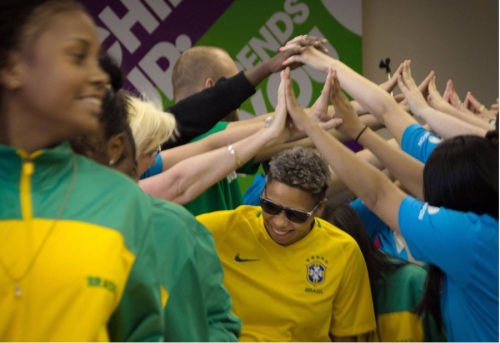Rising youth homelessness will come under the spotlight on Friday as the Street Child World Cup kicks off in Moscow, where 230 children from 20 countries are taking part in a football tournament and congress on their rights.
A month before the FIFA World Cup in Russia, the week-long event aims to draw attention to a problem that experts say is vastly under-reported and leaves young people at risk of sex trafficking and arrest.

Girls from Team Brazil, based in Rio, are greeted by volunteers as they arrive for the tournament in Moscow. PICTURE: Pierce Wilson.
“Because of factors like conflict, migration and austerity, the population of homeless children and youth is increasing,” said Duncan Ross, co-head of British charity Streetinvest.
“The response has been to rescue or to criminalise them…What they need is help to develop their potential.”
Although the figure of 150 million is widely cited, there are no exact numbers on youth living and working on the streets, who often head to towns and cities in hope of finding work, only to end up being exploited and abused.
Urban growth has outpaced infrastructure and housing provision in many cities, pushing entire families on to the streets, said Mr Ross.
Babu Dey, who was once homeless and now works with Child in Need Institute, a charity helping streetchildren in Kolkata, said an expansion of informal settlements and migrant camps in the Indian city was pushing more youths into homelessness.
“Young people may also be lured away by traffickers into sex work, for example, and some are rejected by their families and the community when they return,” he told the Thomson Reuters Foundation.
The teenagers taking part in the Street Child World Cup, aged 14 to 17, have all been brought by organisations that work with homeless and socially excluded children in their countries.
For many, travelling to Russia, from countries such as Mexico, Mauritius, India, Kenya, England, Belarus and Tanzania, has meant getting identity papers for the first time.
“I am so excited to be here,” said Eswari, a 15-year-old girl from India who declined to give her full name, as teams arrived on Thursday. “I never thought I’d come to Moscow.”
The competition kicks off with an exhibition match between the girls’ teams from Russia and Brazil on Friday, leading up to the final game next Wednesday at FC Lokomotiv Moscow, home of the Russian Premier League champions.
Excitement around the competition has already brought some of the teenagers into contact with senior government officials.
“Before coming to Moscow, the team from Pakistan met their president, the Kenyan team have met their sports minister and girls from India have met Bollywood star Rajinikanth,” said John Wroe, head of Street Child United, which organises the event.
Experts hope the World Cup will provide the children with more than photo opportunities with national leaders.
“If we do not make them visible…we won’t be able to hold governments accountable to international and national child rights commitments,” said Caroline Ford, head of the Consortium for Street Children, a global rights network.






